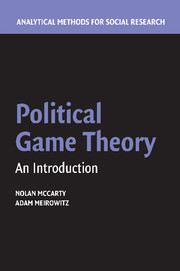Book contents
- Frontmatter
- Contents
- Acknowledgments
- 1 Introduction
- 2 The Theory of Choice
- 3 Choice Under Uncertainty
- 4 Social Choice Theory
- 5 Games in the Normal Form
- 6 Bayesian Games in the Normal Form
- 7 Extensive Form Games
- 8 Dynamic Games of Incomplete Information
- 9 Repeated Games
- 10 Bargaining Theory
- 11 Mechanism Design and Agency Theory
- 12 Mathematical Appendix
- Bibliography
- Index
9 - Repeated Games
Published online by Cambridge University Press: 05 June 2012
- Frontmatter
- Contents
- Acknowledgments
- 1 Introduction
- 2 The Theory of Choice
- 3 Choice Under Uncertainty
- 4 Social Choice Theory
- 5 Games in the Normal Form
- 6 Bayesian Games in the Normal Form
- 7 Extensive Form Games
- 8 Dynamic Games of Incomplete Information
- 9 Repeated Games
- 10 Bargaining Theory
- 11 Mechanism Design and Agency Theory
- 12 Mathematical Appendix
- Bibliography
- Index
Summary
Many models in political game theory involve agents' playing the same game repeatedly. In many of these cases, the focus is on how certain social practices such as conventions, norms, cooperation, and trust are sustained when actors have short-run incentives to deviate from these practices. Another significant application of “repeated games” is the study of how to solve social dilemmas such as the Prisoner's Dilemma without recourse to centralized authority (Taylor 1976).
The most interesting conceptual issue in such games is the extent to which repetition creates the opportunity to sustain more behavior as Nash equilibria than is possible in single-shot games. In general, the set of Nash equilibria is much larger in repeated games than in the corresponding static versions; expectations that future play is dependent on current behavior can create incentives for behavior that is not optimal in a one-shot interaction. Repeated games, however, generate an opposite problem; the proliferation of equilibria is so great that generating precise predictions becomes difficult.
To see how expectations about the future can influence behavior, consider the normal form game in Table 9.1.
If this game is played once there are only two Nash equilibria: (M, M) and (B, R) (starred in the table). Although the strategy profile (T, L) provides the highest aggregate payoff, it is not a Nash equilibrium; player 1 unilaterally defects to B and player 2 unilaterally defects to R.
- Type
- Chapter
- Information
- Political Game TheoryAn Introduction, pp. 251 - 274Publisher: Cambridge University PressPrint publication year: 2007



